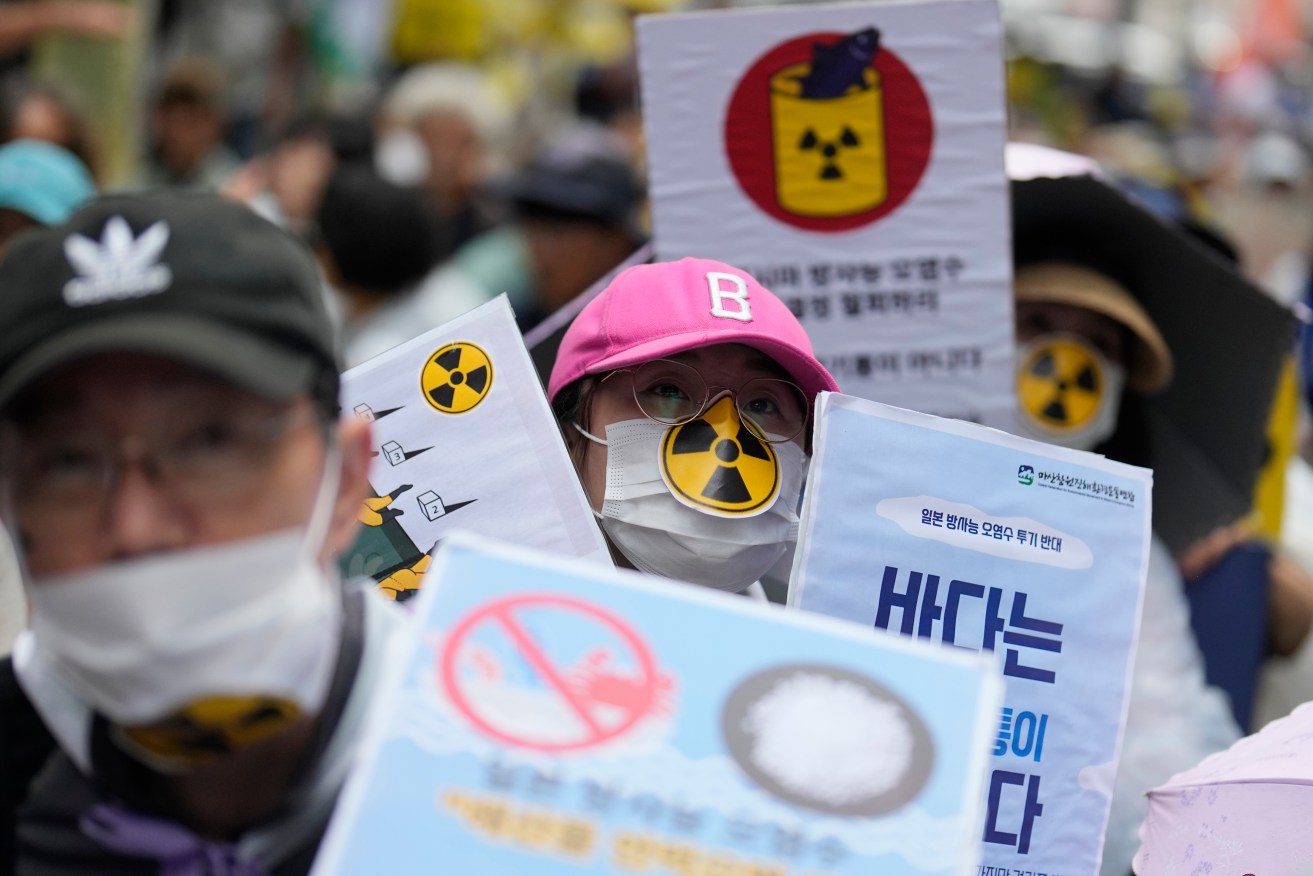Why the nuclear option is clever in opposition but a nightmare in government
The Coalition’s push to include nuclear energy in the nation’s arsenal has nothing to do with solving the climate debate.


Members of civic groups attend a rally to oppose the Japanese government's plan to release treated radioactive water into the sea from the damaged Fukushima nuclear power plant, in Seoul, South Korea, Saturday, Aug. 12, 2023. Anxious about Japan’s impending release of treated nuclear wastewater from the tsunami-damaged Fukushima nuclear power plant, hundreds of South Koreans marched in their capital on Saturday. (AP Photo/Lee Jin-man)
If only that was the case.
The first and most reasonable question for them is why is the Coalition is pushing nuclear now and did nothing to progress it when they were in power?
The answer is just as reasonable. It has no hope and it’s not because of its inherent cost and efficiency, which seems to make up a lot of the debate.
An example of how difficult it would be to push forward with nuclear energy was the recent Federal Court decision to overturn the approval of medical waste dump for radioactive material in the South Australian town of Kimba, where the issue had split the town.
It took a decade to get to that point and the division in Kimba would be likely to be played out nationally if the Coalition ever got serious about adopting nuclear energy.
And we need a waste dump. Currently, the waste is stored in about 100 sites around the country, including hospitals, which is less than ideal.
The reason the Coalition has started pushing nuclear is very much the same reason it won’t succeed. It’s devisive. It would be a nightmare.
You may think that’s a criticism of the Coalition but it isn’t. It’s politics and clever politics, as well.
Nuclear provides an agitation point for the Albanese Government and a pivot on which the Coalition can position themselves as forward-thinking and rational. It can talk about it as a clean energy option that is far more efficient than wind and solar. There are also plenty of examples of where it has worked well just as there are examples of where it was a complete environmental and social disaster.
It should also be noted that a nuclear power station in the US was recently completed seven years late and cost $US34 billion ($52.3 billion), about $US21 billion over its initial budget.
While adopting nuclear, the LNP in Queensland has ditched coal. Its support is now whispered rather than championed, as it was in 2019 when it was instrumental in handing Government to Scott Morrison.
Standing almost alone in backing coal is Senator Matt Canavan, who is also a nuclear proponent. He is part of a Coalition push to end the ban on nuclear energy.
Canavan talks about the clear evidence that Australia’s ban on nuclear energy was out of step and out of date.
“As we shut down coal-fired power stations for no good reason, the nuclear ban risks our energy security. And now that we are purchasing nuclear submarines, continuing with our ban risks Australia’s national security too.” Senator Canavan said.
“The evidence from around the world shows that nuclear energy is the lowest cost form of low carbon electricity. Australian families are paying too much for electricity. To get power bills down we need nuclear energy.”
It should be noted that Canavan has been an opponent of adopting a net zero policy.
You can see by those comments where the Coalition wants to fight this debate. Cost, efficiency and power bills. All easy talking points that it can use out on the stump.
The real issues however are about waste, where a nuclear power station would be sited, how much would it cost and how long would it take to develop and, most importantly, is it safe? All pretty reasonable questions.
Whether they would continue to advocate for nuclear if they returned to Government is a completely different question. It’s reasonable to assume that the issue would be handed to a committee where it would gather dust.
Up to a point the Coalition is right. We should never completely dismiss an energy source, particularly one as powerful as nuclear. And if fusion energy or small nuclear reactors ever become viable we would look like Neanderthals to dismiss it completely. We would also be crazy brave to be among the first to adopt it.
The problem is nuclear remains a social and environmental nightmare. Fukushima is still fresh in everyone’s memory and while it remains so the case for nuclear is just a nice political debating point.












